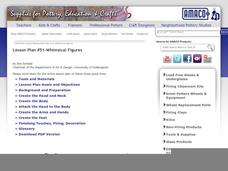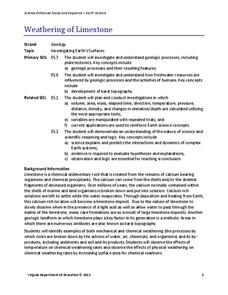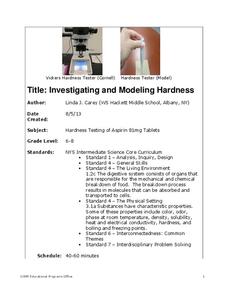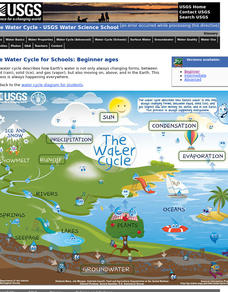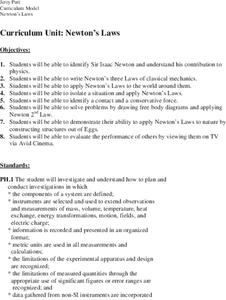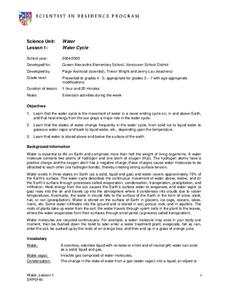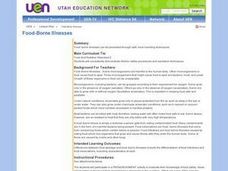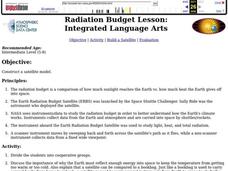K12 Reader
Water Cycle
solid, liquid, and gas. The three different forms of water are the subject of the article used to assess reading comprehension. After reading the article, kids respond to a series of comprehension questions based on the text.
AMCO
Whimsical Figures
Clay is a wonderful and expressive medium for learners of any age. Kids get creative as they make whimsical figures out of clay. A hyperlinked materials list, images of each step in the process, and helpful tips makes this a great art...
National Heart Association
Cold Weather Fitness Guide
Don't sacrifice physical activity every time cold winter weather arrives. From walking or circuit training to warm, healthy recipes and safety reminders, this resource will help encourage learners to prioritize their fitness and stay...
Poetry Class
Tackling Climate Change
Get your kids thinking about climate change with a series of activities that include creating a ditty box poem for the planet, a poem that identifies concepts or objects they would want to preserve.
Virginia Department of Education
Weathering of Limestone
We all know limestone weathers, but what affects the rate of weathering? Young scientists investigate the physical and chemical weathering of limestone (chalk) through experimentation. First, they conduct trials with different-size...
National Energy Education Development Project
Exploring Transportation
Did you know horsepower is actually based on the power of a horse? 60 horse power is the equivalent of being pulled by a team of 60 horses! Viewers will learn other interesting facts like this from a presentation that begins with the...
National Institute of Open Schooling
Spontaneity of Chemical Reactions
Do spontaneous reactions really occur? Activity 12 in a series of 36 focuses on spontaneity of chemical reactions. Learners read about, discuss, and answer questions pertaining to entropy, explain the third law of thermodynamics, explore...
Space Awareness
The Big Meltdown
Explore the world (our world) of melting ice caps. Why are these caps melting? What is the effect of melting ice caps? Dive into the ever-present issue of global warming with a resource that has learners looking at data and participating...
Cornell University
Investigating and Modeling Hardness
Model hardness testing with a self-designed hardness test. Young scholars rate the hardness of different types of aspirin using the Vicker's Hardness scale. They then relate hardness to the solubility of each aspirin tablet.
Cornell University
Atomic Bonding
Explore the connection of surface area to bonding within atoms. Learners complete lab investigations to model changing surface area with different sizes and concentrations of atoms. A flour fireball demonstration follows the labs to...
NOAA
Climate Is Our Friend…Isn’t It?: Make an Extinction Polyhedron
Climate affects populations in different ways. Scholars research extinct organisms and mass extinctions in part three of the 10-installment Discover Your Changing World series. They create graphic organizers, then fill in the information...
US Geological Survey
The Water Cycle for Schools: Beginner Ages
Explore a day in the life of a water droplet. An interactive infographic helps scholars learn how water cycles work from precipitation all the way around to condensation. Learners hover over each step of the cycle to read more as they...
Curated OER
Surface Meteorological Observation System (SMOS)
Learners investigate local surface weather conditions. They log weather conditions for thirty days, develop a graph, plot cloud cover, and compare/contrast the graphed lines of various weather factors.
Curated OER
Solids
In this solids worksheet, students review terms associated with solid matter including, freezing and melting point, viscosity, and Brownian motion. This worksheet has 1 short answer and 14 matching questions.
Curated OER
Biodiesel Combustion and Its Influences in NOx Emissions
Tenth graders evaluate the physical mechanisms that cause a change in NOx emissions. For this combustion lesson, 10th graders participate in a research project. Students create a presentation of their findings.
Curated OER
Newton's Laws
Students examine and discuss Newton's Laws and discover his contribution to physics. In groups, they participate in an experiment in which they much apply the Laws to the world around them. They describe contact and conservative forces...
Curated OER
The Chemicals of Living Cells
Designed to be a study guide or self assessment for high school biologists, the worksheet has good questions about cell chemistry, but would need to be reformatted if you want your kids to write their answers on the paper. There are also...
Curated OER
CO2 and Air Pollution
Seventh graders observe and test for the presence of carbon dioxide gas. They compare concentrations of carbon dioxide gas and conclude high concentrations of carbon dioxide gas are unhealthy for human beings.
Curated OER
Cooler In The Shadows
Students investigate the concepts of shadows and how they are projected with objects different positions in relation to the sun. They conduct an experiment by observing objects in different positions. Then students record the observations.
Curated OER
The Magma Also Rises
Convection is thoroughly demonstrated using a model of Earth's mantle. Detailed background information is provided for the teacher, as well as a list of materials. Although a colorful and detailed worksheet is available for the class,...
Curated OER
De"compost"ition
Learners develop an understanding of the decomposition process and the parameters which influence the rate at which it occurs.
Curated OER
Water Cycle
Young scientists explore Earth elements by conducting an experiment. They define water vocabulary terms such as condensation and precipitation. In addition, they conduct a water experiment in which they build a terrarium, so they can...
Curated OER
Food-Borne Illnesses
Use this lesson to have your charges consider the differences between food spoilage and food-borne illnesses including the differentiation of food infections and food intoxication, including characteristics of each. Some excellent...
Curated OER
Radiation Budget
Students examine the radiation budget and the launching of the Budget Satellite. They role-play as designers of the satellite and construct one with a power source, instruments, and sensors. they explain how their satellite functions...
Other popular searches
- Heat and Temperature
- Physics Heat and Temperature
- Science Heat and Temperature
- Heat and Temperature Test
- Heat Energy Temperature
- Heat and Temperature Change
- Heat Temperature
- Heat and Temperature Metal
- Heat Energy Temperature Burn
- Temperature Heat Expansion
- Heat and Temperature Unit
- Heat vs Temperature



